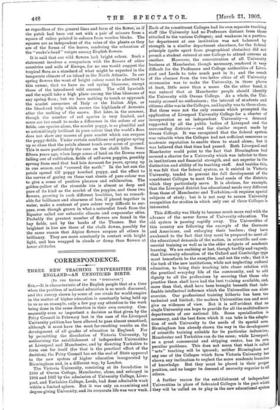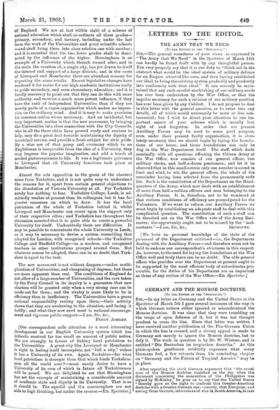CORRESPONDENCE.
THREE NEW TEACHING UNIVERSITIES FOR ENGLAND—AN UNNOTICED BIRTH.
LTO THE EDITOR OF THE " SPECTATOR."]
SIE,—It is characteristic of the English people that at a time when the problem of national education is so much discussed, and the energy shown by some of our rivals for world-empire in the matter of higher education is constantly being held up to us as an example, only a few pay any attention to the work being done in the same direction in their own country. Con- sequently even so important a decision as that given by the Privy Council in February last in the case of the Liverpool Uniiersity petition has been allowed to pass almost unnoticed, although it must have the most far-reaching results on the development of all grades of education in England. For by permitting the dissolution of Victoria University, by authorising the establishment of independent Universities at Liverpool and Manchester, and by directing Yorkshire to form one for itself (for that is the practical effect of the decision), the Privy Council has set the seal of State approval to the new system of higher education inaugurated by Birmingham and, in a different way, by London.
The Victoria University, consisting at its foundation in 1880 of Owens College, Manchester, alone, and enlarged in 1884 and 1887 by the admission of University College, Liver- pool, and Yorkshire College, Leeds, had done admirable work within a limited sphere. But it was only an examining and degree-giving University, and its corporate life was very weak. Each of its constituent Colleges had its own separate teaching staff (the University had no Professors distinct from those attached to the various Colleges); and weakness in a particu- lar department at one institution was not balanced by strength in a similar department elsewhere, for the federal principle (quite apart from geographical obstacles) did not permit a student entered at one College to attend courses at another. Moreover, the concentration of all University business at Manchester, though necessary, rendered it very difficult for the Professors and College authorities of Liver. pool and Leeds to take much part in it ; and the result of the absence from the two latter cities of all University ceremonies was to make the University, in those places at least, little more than a name. On the other hand, it was natural that at Manchester people should identify the University with Owens College. As a whole, the Uni- versity aroused no enthusiasm ; the interest of students and citizens alike was in the Colleges, and loyalty was to them alone. But these were not the only reasons which prompted . the application of Liverpool University College for a charter of incorporation as an independent University—a demand supported by all the public bodies of Liverpool and the surrounding districts—and the similar request made by Owens College. It was recognised that the federal system was valuable when the Colleges had not sufficient resources or academic reputation to enable them to stand alone; but it was believed that that time had passed. Both Liverpool and Manchester could point to the fact that Birmingham had secured a charter for a University which was inferior to them in institutions and financial strength, and not superior in the distinction and ability of its teaching staff. And besides this, it was felt that the federal system, as it existed in Victoria University, tended to prevent the full development of the constituent Colleges to meet the local needs of the districts which they particularly serve. It is obvious, for example, that the Liverpool district has educational needs very different from those of Manchester and Yorkshire,—it requires special subjects of study; but it is not easy to secure University recognition for studies in which only one of three Colleges is interested.
This difficulty was likely to become much more real with the advance of the newer forms of University education. The old system is passing rapidly away. The Universities of this country are following the example of the Germans and Americans, and enlarging their borders; they have awakened to the fact that they must be prepared to meet all the educational demands of the nation, in scientific and com- mercial training as well as in the older subjects of academic learning. We are realising at last, though tardily as d vaguely, that University education of the Oxford and Cambridge type must henceforth be the exception, and not the rule ; that it is the task of the new institutions, while not neglecting cultural education, to bring their teaching into closer relation with the practical everyday life of the community, and to add dignity to all the professions by securing that those who practise them shall have had the best training available, and, more than that, shall have been brought beneath that bide- finable intellectual influence which the Universities can alone exercise. Our professional training hitherto has been too technical and limited; the modern Universities can and must give us wideness of view. But it is self-evident that no single University can hope to provide for all the multitudinous departments of our national life. Some specialisation is necessary, and the best form which it can take is the adapta- tion of each University to the needs of its special area Birmingham has already shown the way in the development of scientific training suitable for its particular industries; Manchester and Yorkshire can do the same; while Liverpool, as a great commercial and shipping centre, has its own peculiar problems. This does not mean that what is called "arts" teaching will be ignored; neither Birmingham nor any one of the Colleges which form Victoria University has shown any inclination to neglect the more academic branches of knowledge. But they must be placed in their proper position, and no longer be deemed of necessity superior to all others.
A further reason for the establishment of independent Universities in place of federated Colleges is the part which they will be 'called on to play in the new educational system of England. We are at last within sight of a scheme of national education which shall co-ordinate all three grades— primary, secondary, and tertiary, including under the last term the work of the Universities and great scientific schools —and shall bring them into close relation one with another ; and it is essential that the two lower grades shall be domi- nated by the influence of the higher. Birmingham is an example of a University which, though named after, and in the main the creation of, a single city, has yet drawn to itself the interest and support of a large district; and in the cases of Liverpool and Manchester there are abundant reasons for expecting the same results. Recent legislative changes have rendered it far easier for our high academic institutions really to guide secondary, and even elementary, education; and it is hardly necessary to point out that they can do this with more authority, and exercise a much more potent influence, if they bare the rank of independent Universities than if they are merely parts of a vague organisation which makes no impres- sion on the ordinary mind. And it is easy to make provision for common action where necessary. And an incidental, but very important, matter is that the new movement, by bringing the Universities into close connection with the City Councils, who in all the three cities have proved ready and anxious to help, may do a great deal towards maintaining the dignity of municipal service, and provide a fresh subjeCt for civic pride. By a. wise use of that pomp and ceremony which to an Englishman is inseparable from the idea of a University, they may impress the popular imagination, and add a touch of needed picturesqueness to life.. It was a legitimate grievance to Liverpool that all University functions took place at Manchester.
Almost the sole opposition to the grant of the charters came from Yorkshire, and it is not quite easy to understand the reasons for it, apart from certain general objections to the dissolution of Victoria University at all. For Yorkshire surely has nothing to fear. Yorkshire College, Leeds, is ad- mittedly weaker at present than its colleagues, but it has far greater resources on which to draw. It has the local patriotism of the whole of Yorkshire behind it, whilst Liverpool and Manchester can count upon the support only of their respective cities; and Yorkshire has throughout the discussion asserted that it is quite able to create a powerful University for itself. Undoubtedly there are difficulties. It may be possible to concentrate the whole University in Leeds, as it may be necessary to devise a system resembling that adopted for London, with recognised schools—the Yorkshire College and Sheffield College—as a nucleus, and recognised teachers in other institutions grouped around them. But whatever course be adopted, there can be no doubt that York- shire is equal to the task.
The new movement is not without dangers,—undue multi- plication of Universities, and cheapening of degrees ; but these are more apparent than real. The conditions of England do not allow of a large number of Universities, and the care taken by the Privy Council in its inquiry is a guarantee that new charters will be granted only when a very strong case can be made out for them ; and the rivalry is more likely to be in efficiency than in inefficiency. The Universities have a grave national responsibility resting upon them,—their activity shows that they are awakening to the situation, and facing it boldly; and what they now need most is national encourage- ment and vigorous public support. —I am, Sir, &c.,
PERCY ASHLEY.
[Our correspondent calls attention to a most interesting development in our English University system which has hitherto received far too small an amount of public notice. We are strongly in favour' of linking . local patriotism to the Universities. A great city like Liverpool or Manchester is right in feeling itself incomplete, not "full a city," unless it has a University of its own. Again, Yorkshire—for what local patriotism is stronger than that which binds Yorkshire- men all the world over P—must surely desire to have a University of its own of which in future all Yorkahiremen will be proud. We are delighted to see that Birmingham has set the example of maintaining a considerable amount of academic state and dignity in its University. That is as it should be.. The squalid and the commonplace are not aids to high thinking, but rather the reverse.—En. Spectator.]











































 Previous page
Previous page